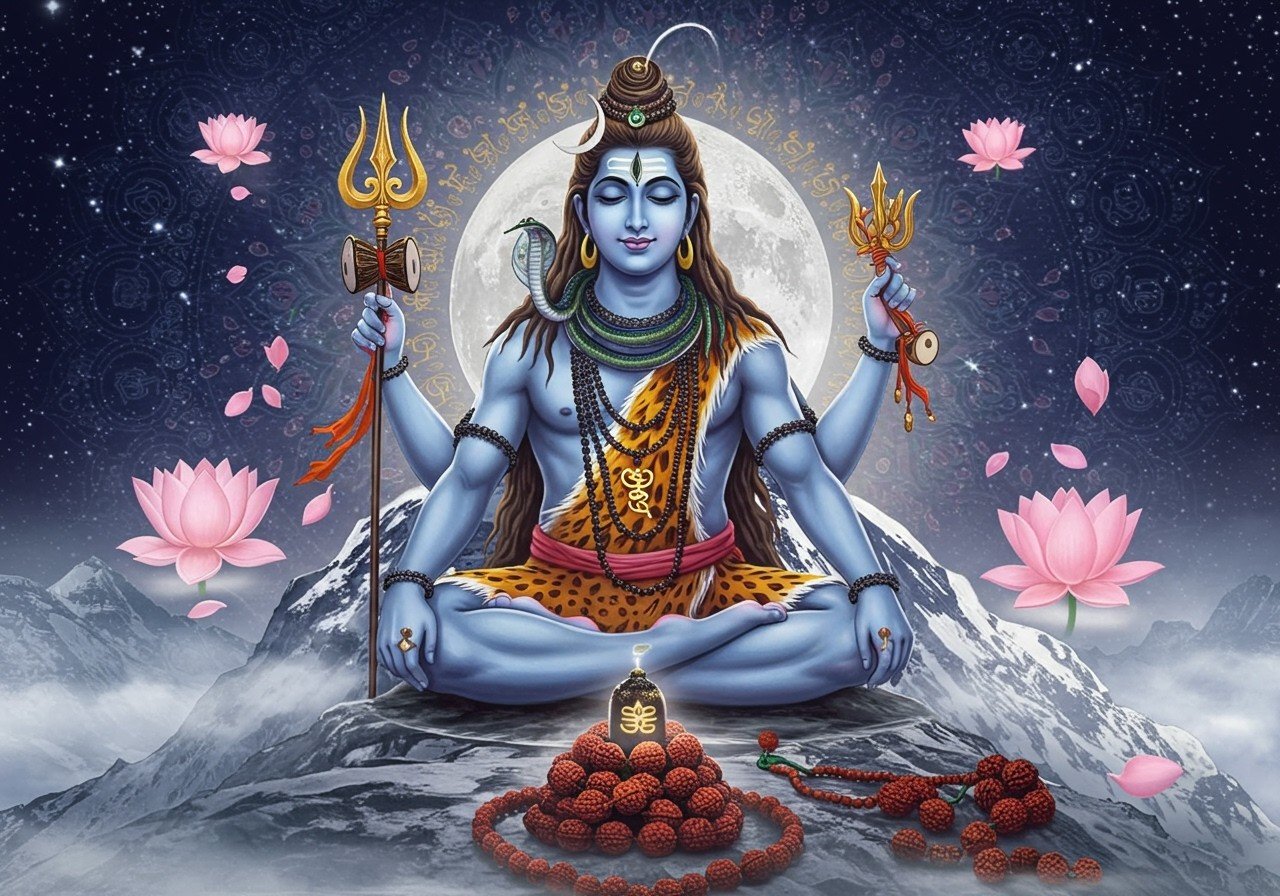
The Shiva Sahasranama, a sacred hymn echoing with a thousand names of Lord Shiva, holds deep significance in Hindu spirituality. Each name isn’t just a word; it’s a window into a divine attribute, a cosmic power, a facet of the Mahadev. Passed down through generations, this powerful hymn is believed to shower countless blessings upon those who recite it or even listen with a devoted heart.
What is the Shiva Sahasranama?
Imagine a tapestry woven with a thousand threads of reverence, each thread a name representing a different aspect of Lord Shiva. That’s the Shiva Sahasranama. In Sanskrit, “Sahasra” translates to thousand, and “Nama” means name. This hymn paints a vibrant portrait of Shiva, the Auspicious One, in his myriad forms and functions. Reciting these names is like invoking his presence, inviting his blessings of spiritual upliftment and tranquility.
Want to learn more about Lord Shiva and his worship? Read our blog post on Shiva Puja Essentials and Ritual Guide.
Exploring the Different Versions
Just as a river flows through different landscapes, the Shiva Sahasranama exists in several versions, each offering a unique perspective on Lord Shiva’s divine qualities. Some of the most well-known versions can be found within the Mahabharata, the Linga Purana, and the Shiva Purana. The Mahabharata version, for instance, resonates with a poetic beauty and is often chanted during traditional worship and ceremonies. The Puranic versions offer profound philosophical insights, making them particularly cherished by scholars and theologians.
The Sacred Origins
The roots of the Shiva Sahasranama run deep into the heart of ancient Hindu scriptures. In the epic Mahabharata, we find the poignant scene of Bhishma, lying on a bed of arrows, imparting this sacred hymn to Yudhishthira amidst the chaos of the Kurukshetra war. The versions found in the Linga Purana and Shiva Purana are believed to have emerged from the divine inspiration of sages, adding further layers of richness to this sacred tradition.
For a deeper understanding of devotional hymns, you might find our blog post on Hanuman Chalisa: Meaning, Benefits, and Recitation enlightening.
The Blessings of Recitation
Reciting the Shiva Sahasranama is more than just a ritual; it’s a spiritual practice with profound benefits:
- Spiritual Growth: It’s believed to purify the soul, washing away sins and paving the path towards moksha, liberation from the cycle of rebirth. This practice helps us connect with our inner selves and the divine.
- Mental and Emotional Well-being: Chanting these sacred names fosters inner peace, like a gentle balm soothing the mind. It can reduce anxiety, sharpen mental focus, and promote emotional stability. It’s a practice that nourishes the mind and calms the spirit.
- Physical Health: Some believe the vibrations of these chants can have a positive impact on physical health, improving circulation and even aiding in managing heart conditions. This connection between the spiritual and physical reflects the holistic nature of well-being.
- Improved Sleep: The calming effect of the chanting can promote deeper, more restful sleep, leaving you feeling refreshed and revitalized.
- Overall Well-being: Regular recitation can lead to a sense of overall well-being, boosting energy levels, fostering positivity, and sparking creativity. It’s like inviting a gentle stream of positive energy into your life.
- Fulfillment of Wishes and Karmic Cleansing: It’s believed that reciting the Shiva Sahasranama can help fulfill heartfelt wishes and cleanse past karmic debts, leading to a lighter and more positive future.
How to Recite the Shiva Sahasranama
Reciting the Shiva Sahasranama is a deeply personal practice. Some choose auspicious days like Maha Shivaratri, while others incorporate it into their daily rituals. A typical practice might begin with a purification ritual, followed by the rhythmic chanting of the thousand names. Offerings like flowers, incense, and water can enhance the experience. Many devotees use a mala, or prayer beads, to keep track of the recitations. Whether chanted in solitude or within a community, the practice is a powerful way to connect with the divine.
Poojn.in: Your Companion on the Spiritual Path
At poojn.in, we understand the importance of having authentic and readily available puja items. We offer a wide selection of products to support your Shiva Sahasranama recitation and worship:
- Complete Shiva Puja Sets: Everything you need, thoughtfully curated in one set. Explore our Puja Samagri collection.
- Sacred Vessels and Idols: Pure copper and brass items crafted with reverence. Find exquisite Shiva Lingams here.
- Rudraksha Malas: For keeping count during your recitations.
- Pure Ghee Diyas and Wicks: For illuminating your sacred space.
- Authentic Incense: Dhoop and agarbatti to create a serene atmosphere.
- Gangajal: Sacred water in sealed containers.
- Bilva Leaves and Other Sacred Items: Essential offerings for Lord Shiva.
Visit poojn.in to browse our complete collection of Shiva puja items. We offer secure payment options and pan-India delivery. For personalized assistance, please call us at 03369029784 or WhatsApp us at 9476142738. Our team is happy to help you select the perfect items for your Shiva Sahasranama puja.
Note: Product availability is subject to change. Please check our website for the latest updates on product stock.
Embracing the Divine
The Shiva Sahasranama is more than just a list of names; it’s a pathway to deeper connection with the divine. By understanding its origins and the different versions, we enrich our appreciation for the vibrant tapestry of Hindu tradition. As you integrate the chanting of these sacred names into your life, you invite peace, blessings, and the transformative power of Lord Shiva into your heart and home.


